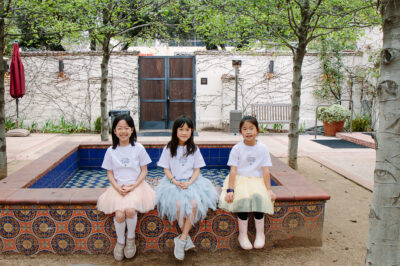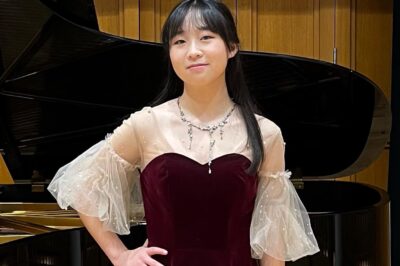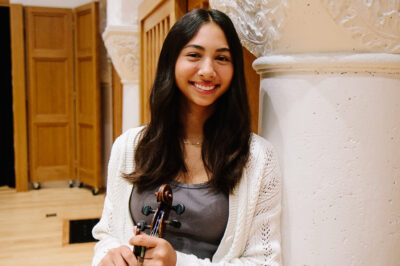John Swain
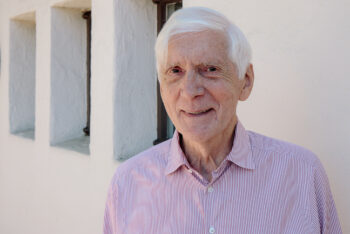
Meet John Swain, an 82-year-old cello student at PCM. Originally from London, John’s love for music was sparked during childhood, attending concerts with his family and singing in school. As a young adult, he enjoyed operas by Verdi, Mozart, and Puccini, and later developed a deep appreciation for Wagner, especially Die Walküre. It wasn’t until his 80th birthday, however, that John decided to learn the cello. Read more below about his pursuit of taking up an instrument later in life and how his involvement in PCM’s adult string ensemble has transformed his perspective on learning, growth, and the joy of playing music with others.
Can you share a little bit about your personal and professional background?
Well, early childhood was wartime and post-war London. Everybody was broke; there was food rationing. My parents wanted to educate their kids as well as they could, so that was the priority. Professionally, I was very fortunate. I went straight to work and fell into sales, which was a natural habitat for me. That led to sales management and general management and I found myself running a business when I was 26 – overseas, with 250 employees.
What brought you from England to the States?
I was offered a job to run a business in New York and working in New York had been a kind of dream of mine. So we decided to have an adventure and brought three small kids to live in Connecticut. I worked in the city and when it came to the end of the three years, everybody wanted to stay. So, stay we did. My second career was in the training and development business. I had a wonderful time with it because it’s a great way to make a living. Plus you’re helping other people to do their work better, which is very satisfying.
What were some of your favorite things to do in New York, culturally?
Well, I know my way around Lincoln Center really well. I used to go to The Met a lot. I would go to New York City Ballet and to the American Ballet Theater when they were dancing at The Met. I didn’t go to Avery Fisher much; I sort of gravitated more towards chamber music and away from symphonic music. But opera is my main thing. I love opera and I love the ballet – the ballet is an extraordinary art form.
Do you have a favorite production?
The old Ring Cycle at The Met. It was just amazing. It was so Wagnerian and you could fantasize away. It was just perfect. I’ll never forget, one day I had a spare ticket for Siegfried and I was standing outside the Met, hoping to sell the spare ticket. Up comes a young man who explains that he wants to see Siegfried, but he hasn’t got any money. Instead of saying no, I asked him what he did, and he was a conducting student at Juilliard from Kazakhstan. And so of course, he and I enjoyed Siegfried together.
Growing up, what role did music play in your life? At what point did you really start loving opera?
My mother was fiercely determined that we were going to be given every opportunity to enjoy the culture, even though we were broke. And so there were things called the Henry Wood Promenade Concerts at the Albert Hall, which is a summer thing. If you wanted to buy tickets, you could. But what people like us did was you joined a line and waited for opening time. When they allowed you in, you could sit around on the floor in the amphitheater or right up in the balcony. And I can remember – I can see my first concert to this day. Denis Matthews was the piano soloist, and he played Beethoven’s Fourth Piano Concerto. I was just blown away.
Another formative musical experience for me was that I went to a singing school. There were school songs and all that kind of stuff, but the big event was that every year we would do an oratorio. And so one year we did The Messiah. One year we did the Creation. Oh, it was amazing. There was no “I can’t sing”; the idea was that, of course you can sing. You just need to work at it. Very formative.
My first girlfriend was a student at the Royal College Music, and she studied singing with Dame Janet Baker. Her parents gave us seats to a Covent Garden production of Fidelio. Later we had this experience of Joan Sullivan singing ‘The Queen of the Night’ in The Magic Flute. So then I listened to all sorts of opera. I couldn’t get on with Strauss and I couldn’t get on with Wagner at first. So I concentrated on Verdi, Mozart, and Puccini. And then later on, I got the Wagner bug – I’ve seen a lot of Ring Cycles.
What was the one piece that hooked you?
Oh, Die Walküre hooks me every time. Die Walküre is astonishing. You’ve got everything. It’s all there in this one opera and, and the most incredible music. There’s that scene at the end, when Brünnhilde is persuading Wotan to look after her and to build the ring of fire around her so that only a hero can rescue her. I mean, it’s just magical. It’s like the most immersive experience you could probably have in the performing arts. You have the set design, you have the music, you have the drama, and you have the mythology. What’s fascinating is also that the people who go really know it.
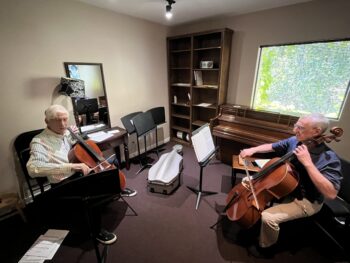
What inspired you to want to learn an instrument as an adult and enroll in the adult string ensemble?
Well, the late Olin Barrett [a longtime PCM board member] introduced me to Ian White Thompson [an adult cello student at PCM]. That was in April 2021. I learned that Ian started learning to play the cello when he was 67 and that we share a couple of coincidences: we went to the same school where we learned to sing and we have the same birthday.
Anyway, around my 80th birthday, after giving some thought to Ian learning the cello, I said to my kids that the next time I’m brought back to a living life, I wanted to play the cello in a string quartet in Sienna. That’s the way I want to spend it. So the kids said, “why don’t you do that now?” and I thought, “why not?” So I signed up with PCM in the summer and started working with Nick Bertani. Nick’s amazing because he encourages you without minimizing the difficulty of what you have to do.
This past June, after Nick told me about this ensemble being formed of adult beginners and asked if I was interested, I signed up for the beginning adult string ensemble with Erika Walczak and Simone Vitucci and it was transformative. Everybody was better than me; I was trying to keep up and had to practice really hard. So my practice level has tripled and quadrupled. It’s just wonderful. And the experience of playing with others – I had no idea. I mean, I knew everybody said that what it’s all about is playing with others. But you don’t really understand what that means until you experience it. And then it’s amazing. It’s such fun.
It’s important to find things that are a good balance of fun, but are also challenging, stimulating.
I subscribe to the thinking that winning is fun. I think doing things better is fun. I think that there’s a sort of fun that comes from an accomplishment that you feel good about, that’s very deep. And [at the performance] I think we all felt that and everybody enjoyed it a lot.
I also think one of the great bits about this stage of life is actually backing off on needing to have too many goals and just enjoying being where you are. But I have to tell you, I do think this is massively good for one’s brain, for one’s physical coordination, for one’s general sort of alertness. I think it’s great for people my age to do something like that.
How has learning cello impacted some of these other areas like alertness and physical coordination?
With the left hand, I know I’m much more coordinated than I was a year ago. I’m also more coordinated with the right hand than I was a year ago because the ensemble work requires lots of string crossings. And so I’m getting much more nimble with the right hand
What were some particular challenges that you face learning the cello or, and in the ensemble?
The constant business of trying to get your left hand to behave at the same time as your right hand. I mean, it’s tough. And, you know, the coordination in an 82 year old body is limited. It takes more repetitions to get it in your muscle memory. But that’s okay.
How has being in an ensemble impacted your playing?
I’m learning more quickly. I’m developing not dramatically faster, but definitely faster. It’s sort of picked up the pace. It’s helped my listening, it’s helped my practice. I think I want it more too. I’m not probably going to play the Bach Cello Suites to a packed Carnegie Hall, but there’s a little bit of ambition, you know.
I also learned from Nick that when you go for something, you tend to play it better than when you’re too cautious. It’s a massive lesson because you put that together with not wanting to let anybody down, and yet you’re gonna play better when you go for it.
So, why the cello?
I’ve always thought it was something special. The cello in the Beethoven string quartets – there’s something marvelous about that depth in the music. I remember a friend of mine had a spare ticket for a solo concert being given by Rostropovich at Avery Fisher Hall – the Bach Cello Suites. He was extraordinary. I mean, what a sound.
What advice would you give to other students who are considering pursuing musical studies as an adult?
Do it. Jump in the water. Don’t let any of those self conscious things get in the way. Just do it. It’s so much fun.
I always used to say that the best part about being connected to a music school was watching kids who hadn’t known how to play, perform their first concert on their little instruments. Then I realized that the best part was watching the parents watch their kids, and now I realize the best part is actually performing in a group. It’s really special.
Anything else you’d like to share with the PCM community?
Well, I have the greatest regard for PCM. And the thing I like most is the fact that everything it does, it does well. It seems that the policy is, “if we’re gonna do it, let’s do it really well”. I’m so impressed, as I always am, with you guys. That you go about things in a customer oriented way. You’ve made it a wonderful experience for all the participants. With regard to the ensemble, these two teachers [Erika and Simone] are just great. They’re very encouraging. They’ve got amazing energy and enthusiasm, and they’re very supportive.
